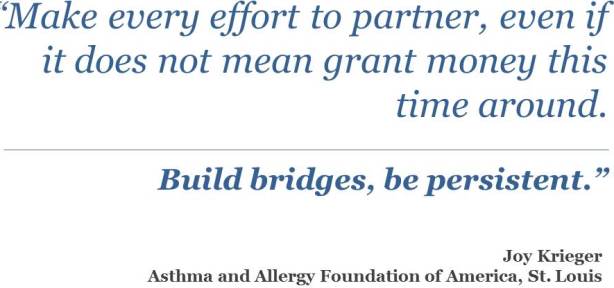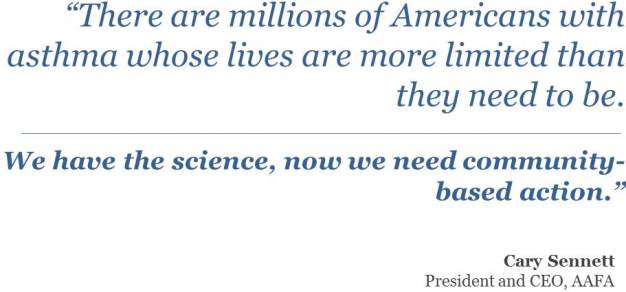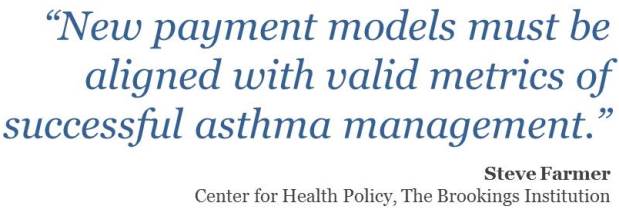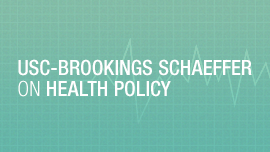To kick off Asthma Awareness Month the Dr. Richard Merkin Initiative on Payment Reform and Clinical Leadership and the Asthma and Allergy Foundation of America (AAFA) hosted a webinar on innovations in community-based asthma care. Featuring presentations from Brookings scholars, AAFA, and the Chief Medical Officer of the Center for Medicaid and CHIP Services (CMCS), the webinar explored innovations in asthma care and ways for policy makers and stakeholders to partner to implement the types of effective asthma programs that are currently difficult to put in place. You can download the slides from the webinar or watch a recording of the entire presentation on our event page.
Joy Krieger, the Executive Director of the AAFA St. Louis branch, kicked off the webinar by discussing AAFA St. Louis’s successful efforts to implement better asthma policy on the ground. AAFA St. Louis has sought to establish funding and services for effective asthma care outside of the hospital, by embracing non-traditional and proven – if previously unfunded – methods of asthma care such as asthma education and home coaching. Thankfully, the organization has seen success, securing a 5 year CDC grant for their asthma education program, developing a referral mechanism for children with high-risk asthma, and funding home assessments, telephonic asthma coaching and education sessions for client families. These interventions have paid off: AAFA’s program to provide school nurses with asthma equipment has kept children in school and prevented avoidable emergency department visits. Krieger emphasized that AAFA St. Louis’s relationships with community partners and legislators were vital in the implementation of these programs, and reiterated that convening a broad coalition of stakeholders can open doors for innovative asthma programs across the country.

Next, Cary Sennett, the CEO of AAFA, discussed his organization’s commitment to ensure that the type of success achieved by AAFA St. Louis is enabled across the country. Dr. Sennett recognized that although we know what is needed to support good asthma care, the current health care payment system does not always support it. He discussed AAFA’s “Asthma Capitals 2015” report, which emphasizes the importance of state and local innovations, observing a 4-fold difference in rates of ER visits and a 2-fold difference in rates of rescue inhaler use between cities that were able to implement innovative asthma programs and cities without them. Dr. Sennett stressed that AAFA’s work has shown ample opportunity for state and local leaders to support effective asthma programs, as long as they are able to forge the types of community-legislator partnerships that AAFA St. Louis so successfully demonstrated.

To provide a glimpse of the support the federal government is able to provide to this innovative work, Dr. Stephen Cha, the Chief Medical Officer of the Center for Medicaid and CHIP Services, outlined CMS’s efforts to encourage effective partnerships that can implement effective asthma care at a local or state level. With this in mind, CMCS has changed their rules to allow for providers who may not have a license to provide services recommended by a licensed provider – opening the door to payment for the types of innovations such as asthma education and home visits that were not previously supported. Dr. Cha sees multiple pathways to reform and better care, and views the role of CMCS as one of bringing partners together and clearing a path for local and state leaders to implement effective asthma programs.
Providing perspective on the lessons learned from AAFA, CMS, and Brookings research into supporting innovative asthma programs, Dr. Steve Farmer, Brookings Visiting Scholar encouraged policy makers and stakeholders to shift the emphasis from health care to health, develop meaningful and valid metrics of success, and align finances across organizations to pay for improved outcomes. With financial realignment, the health system can better support the type of innovations, which are proven to improve outcomes for patients with asthma. Dr. Farmer emphasized that all stakeholders – payers, providers, community leaders and policy makers – must work together to improve care and outcomes for patients with asthma nationwide.

The Brookings Institution is committed to quality, independence, and impact.
We are supported by a diverse array of funders. In line with our values and policies, each Brookings publication represents the sole views of its author(s).




Commentary
Event recap: Improving asthma care through community coalition building
May 18, 2015